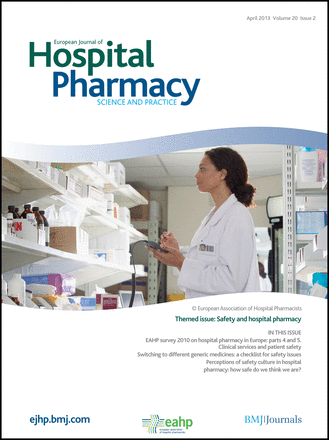EAHP EU Monitor 15 May 2013
The EAHP EU Monitor is a weekly round up of news relevant to hospital pharmacy in Europe.
You can subscribe to the EAHP EU Monitor here.
European specialists call on Commission and national governments to improve qualification recognition procedures
More information here.
SPECIAL BRIEFING: Draft ENVI report calls for central authorisation for high risk medical devices
A draft report of the European Parliament’s Health Committee (ENVI) has called for a centralised procedure for assessing and approving high risk medical devices for the European market, similar to that in existence for medicines approved by the European Medicines Agency.
Reviewing the European Commission’s September 2012 proposals for improving medical device regulation, the lead rapporteur for the European Parliament, Dagmar Roth-Behrendt (Germany, Social Democrat) has accepted the case made by stakeholders such as the European Social Insurance Platform and others, that the delegated “notified body” system of approval, whereby national competent bodies may approve a device for use across Europe (the CE mark), was insufficient in respect of those devices presenting highest risk of harm to patients. Ms Roth-Behrendt is proposing a system similar to that in place in America, where the Food and Drug Administration (FDA) centrally authorize devices. The system proposed in the Draft report proposes a new Committee of the European Medicines Agency be constructed to oversee the approval process.
Draft report here.
European Social Insurance Platform position here.
Ms Roth-Behrendt’s amendments to create central authorization for class III devices are likely to be opposed by federations representing the medical device industry and may lead to a lengthy period of debate and discussion with the European Commission and national Governments about the final changes, with a subsequent risk that the subject file will not be concluded by the time of the next European Parliament elections in 2014.
The European Association of Hospital Pharmacists has lobbied MEPs to amend the Commission’s proposals on medical device regulation in order to ensure:
- Coordination between vigilance reporting requirements for medical devices and medicines in order to encourage overall health professional familiarity with reporting processes and to reduce unnecessary confusion
- Careful construction and implementation of new tracking and unique identification systems for medical devices in order to coordinate with the pan-European medicines verification system being introduced by the Falsified Medicines Directive (2011). Coordination is required to prevent system duplication and unnecessary expenditures in the hospital sector.
- An emphasis on information transparency in respect of the planned development and enhancement of the EUDAMED database (the European Databank on Medical Devices).
SPECIAL BRIEFING: European Parliament prepares to finalise position on clinical trial regulation
.jpg) The European Parliament is preparing to finalise its position on the future of clinical trial regulation with voting on its final report scheduled to take place on the 29th May.
The European Parliament is preparing to finalise its position on the future of clinical trial regulation with voting on its final report scheduled to take place on the 29th May.
The Draft Report of the ENVI Committee (January 2013) has subsequently been followed by the publication of opinion reports from the Internal Market Committee (IMCO), the Research and Industry Committee (ITRE) and the Civil Liberties Committee (LIBE).
The main areas of debate and discussion that have emerged in the Parliament centre on:
- How far to extend obligations to report trial results
The January 2013 draft ENVI report amended the Commission’s July 2012 proposals by upgrading the proposed requirement that all registered trials submit a summary of results, to a requirement that all registered clinical trials submit a Clinical Study Report, a fuller and more detailed summation of a trial result.
Supporters of the proposal, such as the Cochrane Collaboration, argue this will provide a significant boost to transparency. Meanwhile concerns have been expressed by other trial stakeholders that this requirement could result in costly and unnecessary burden for less well-financed and lower scale trials.
The ENVI report goes further in proposing the operation of a financial penalty regime for non-compliance with transparency requirements.
- How far the role of Ethics Committees in the trial process should be made explicit in the regulation
Both the January 2013 draft ENVI report and the March 2013 report of the Parliament’s Industry and Research Committee (ITRE) considered that the Commission’s proposals for a new clinical trial regulation did not go far enough in expressing the key role of Ethics Committees in the conduct of clinical trials. Both reports therefore propose amendments that write in to the regulation stipulated roles of Ethics Committees, largely in keeping with current common practice. For example the ITRE Committee report called for the conduct of any clinical trial to be conditioned on the prior approval of an Ethics Committee, and the ENVI Committee report calls for the term Ethics Committee to be defined in the regulation as meaning “an independent body in a Member State, which includes healthcare professionals, laypersons and at least one well-experienced, knowledgeable patient or patient representative whose responsibility it is to protect the rights, safety and well-being of subjects and to provide public assurance of that protection.”
- How long clinical trial master files should be archived for
Whilst the ENVI and ITRE Committee reports proposed indefinite retention of the clinical trial master file. As justification, ENVI and ITRE has cited “some long-term adverse drug reactions such as cancer or teratogenicity that only appear after decades of use, sometimes even going beyond one generation of patients, i.e. Diethylstilbestrol (DES) disaster between the 1950s and 1970s, therefore it is important to guarantee the conservation of the master file for an indefinite time.”
However, the April 2014 report of the European Parliament’s Civil Liberties Committee (LIBE) has proposed a contradicting amendment that would require the trial sponsor and investigator to archive the trial master file for a maximum period of 5 years.
Draft ENVI Committee report available in multiple languages here.
IMCO Committee opinion report here.
ITRE Committee opinion report here.
LIBE Committee opinion report here.
 EJHP: the quality and quantity of patients’ own drugs brought to hospital during admission
EJHP: the quality and quantity of patients’ own drugs brought to hospital during admission
The online first edition of the European Journal of Hospital Pharmacy has this week published a research article investigating the quality and quantity of patients’ own drugs (PODs) brought to hospital during admission.
The research took place in four wards and three hospitals between March 2010 and July 2011 and found that more than half of patients brought their own medicines to hospital which gave the advantage of providing medication history. The majority of PODs were suitable for use in hospital. Only 7.5% of all PODs were actually used because substitution to generic or equivalent drugs from the hospital's formulary was preferred.
Full article here.




